CIEL | Meet the scientist
Know-how and experience
Finding the answers to today’s agri-food challenges and driving greater efficiency, resilience and wealth across the sector, we work alongside world-leading scientists, drawing on the expertise of many of the UK’s top academic institutions and specialist livestock centres in our research alliance.
Innovation and opportunity
Meet some of the scientists who are taking on our current and future food sustainability and production challenges.
Want to talk?
If you have a query or would like to talk to us about any of the scientists we work alongside, please get in touch.
Dr Amy Taylor, University of Leeds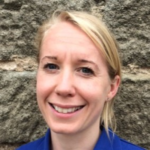
Lecturer in Animal Health and Nutrition
Amy’s research focuses on sustainable pig production, maximising nutrient availability and feed efficiency through diet manipulation such as changes in diet composition and the addition of enzymes.
 Professor Lisa Collins, University of Leeds
Professor Lisa Collins, University of Leeds
Professor of Animal Science | N8 Chair in Smart Agri-Systems | Director of the National Pig Centre | Head of School of Biology | Deputy Director Global Food and Environment Institute (Commercial Research) Lisa’s research focuses on the development and application of smarter agricultural systems through multi-disciplinary approaches including technology development, systems modelling and data analytics.

Dr Graham McAuliffe, Rothamsted Research
Postdoctoral Research Scientist in Sustainability Assessment | Specialist in life cycle assessment of agricultural products Graham specialises primarily in developing novel approaches to account for uncertainties in cutting edge applications of Life Cycle Assessment (LCA), such as calculating individual animal carbon footprints and, more recently, assessing the role of human nutrition in the interpretation of agrifood systems’ environmental impacts.
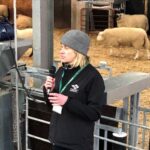 Dr Nicola Lambe, SRUC
Dr Nicola Lambe, SRUC
Sheep Geneticist | Nicola has been working for SRUC for over 15 years, mainly working on sheep breeding research projects. Since 1997 she has been closely involved with the work of the SRUC CT unit, including undertaking a PhD based on CT scanning of breeding hill ewes to assess seasonal tissue changes.
Becky Willson, Farm Carbon Toolkit/Duchy College Rural Business School
A passionate advocate for highlighting the economic benefits of sustainable farming, Becky currently divides her time between working for Farm Carbon Toolkit and working for Duchy College Rural Business School as a technical specialist in resource management. The farm networks Becky is involved with are an added benefit Duchy College brings to the CIEL collaboration. With carbon a hot topic, the information Becky and colleagues are generating provides valuable insights and is informing tool development in this area, “keeping it real” through end-user field testing.
Professor Lucy Asher, Newcastle University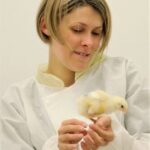
Professor Animal Behaviour Informatics | Lucy has spent her career investigating the complexity of animal behaviour and linking this with animal welfare. Having completed a PhD in animal behaviour at Newcastle University, she returned in 2015 to take up a position as Senior Newcastle University Research Fellow. In 2019 Lucy took a Senior Lectureship and was made a professor in 2020.
Dr Steven Morrison, Agri-Food and Biosciences Institute (AFBI)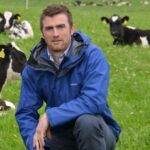
Head of Livestock Production Sciences Branch | Steven’s career with AFBI spans over 15 years and several scientist roles. He also has direct experience of working for industry on a livestock genetics improvement project. Talents however extend beyond his vast knowledge of livestock, having climbed Kilimanjaro, being a trained gymnastics coach, and supposedly related to John Wayne!
Dr Sarah Lambton, University of Bristol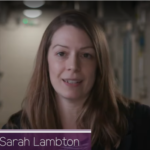
Lecturer in Livestock Welfare and Innovation | Bristol Veterinary School | Sarah’s research is focussed in particular on the health and welfare of laying hens. Following undergraduate and masters degrees in biological sciences at the University of Oxford, Sarah moved to Bristol, completing her PhD in 2008 investigating the development of injurious pecking behaviour in laying hens.
Professor Jasmeet Kaler, University of Nottingham
Professor of Epidemiology and Precision Livestock Informatics | Jasmeet leads the Ruminant Population Health research area in the School of Veterinary Medicine and Science at the University of Nottingham. She is also the University’s Director of Equality Diversity and Inclusion.
Professor Jos Houdijk, Scotland’s Rural College (SRUC)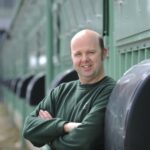
Head of Monogastric Science Research Centre | Jos is an internationally-renowned animal nutritionist with an interest in nutritional sensitivity of animal production, health, disease and environmental footprint. In his current role Jos leads a team studying a range of issues linked to nutrition in pigs and poultry
Dr Ruth Wonfor, Aberystwyth University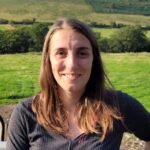
Lecturer in Animal and Equine Science | Institute of Biological, Environmental and Rural Sciences (IBERS) | Ruth’s research is mostly focussed on animal health and the effects on production, using either whole animal studies or lab-based models of diseases.
Dr Fiona Houston, University of Edinburgh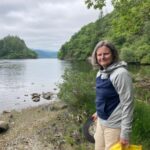
Group Leader | Chair of the Large Animal Steering Group | Fiona is Group Leader at the world-renowned Roslin Institute and chair of the Large Animal Steering Group, which provides academic oversight of the management and activities of Roslin Large Animal Research facilities, including the CIEL co-funded Large Animal Research and Imaging Facility (LARIF). Fiona’s research group focuses primarily on prion diseases, such as scrapie and bovine spongiform encephalopathy (BSE). Fiona also has an interest in other infectious diseases of small ruminants.
Dr Taro Takahashi, University of Bristol
Senior Lecturer in Sustainable Livestock Systems and Food Security | Bristol Veterinary School | Taro’s research interests include bioeconomic modelling and life cycle assessment (LCA) of livestock production systems as well as programme evaluation and general equilibrium modelling of pasture and livestock-based economies. In addition to his role at Bristol Veterinary School, Taro also works as a Research Scientist at Rothamsted Research’s North Wyke Farm Platform.
Professor Jude Capper, Harper Adams University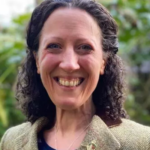
ABP Chair in Sustainable Beef Production | Eminent agricultural sustainability scientist Professor Jude Capper is currently working closely with processors ABP Food Group to better understand and quantify the factors that affect beef and sheep system sustainability, from greenhouse gas emissions through to biodiversity.
Dr Brian Quinn,  Queen’s University Belfast
Queen’s University Belfast
Head of Mass Spectrometry | Institute of Global Food Security (IGFS) | Brian has worked as a scientist for over 30 years. He currently works out of the IGFS ASSET (‘Assured, Safe and Traceable’) Centre which houses leading platforms to facilitate increasingly rapid identification of feed and food contamination and adulteration. The equipment is among the most specialist in a UK university and was possible due to the partnership with CIEL, thanks to the support of Innovate UK, and Invest NI, through the European Regional Development Fund, as well as instrument manufacturers.
Professor Hermine Mkrtchyan,  University of West London
University of West London
Professor of Microbiology and Head of Research | Professor Hermine Mkrtchyan has substantial expertise in bacterial resistomes and global dissemination of antimicrobial resistance and its transmission between humans, livestock and environmental microbiomes.
Dr Farina Khattak, 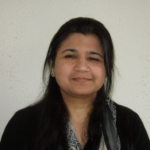 SRUC
SRUC
Commercial Research Scientist| Study Director | As a poultry nutritionist, Farina is extensively involved in planning, executing, analysing and reporting commercial nutritional projects. Her studies range from proof of concept to novel in-depth investigations to unveil the mode of action of the novel products tested. Current studies also include measuring greenhouse gas emissions (CO2, NH3, N2O and CH4).
Dr Adam Hayward,  Moredun Research Institute
Moredun Research Institute
Research Fellow | Adam’s role is to bring data-driven approaches to research on livestock diseases, particularly helminth parasites of sheep and cattle. Animals vary enormously in their resistance to infection, and in how infection affects their performance. Through his research, Adam aims to identify the causes of this variation to find ways of limiting the effects of parasites on livestock.

